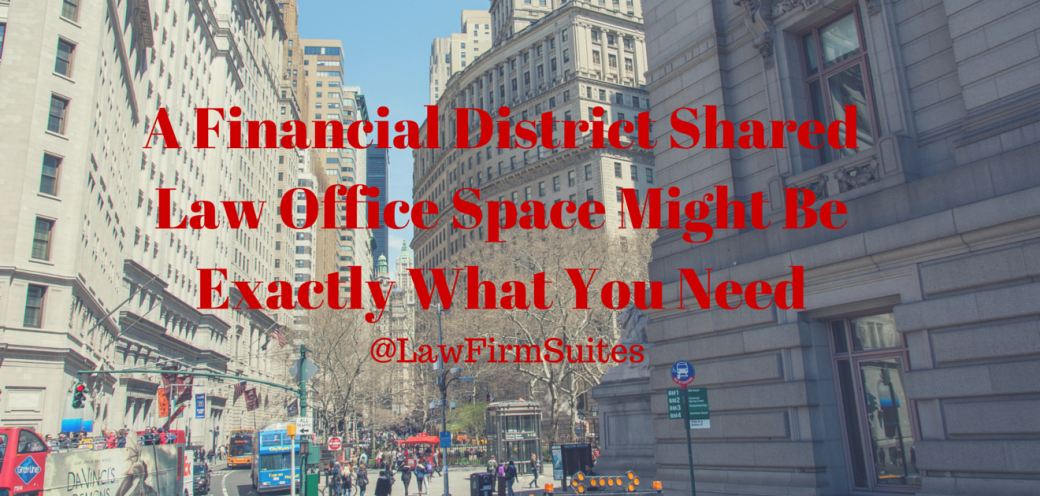Solos and small firms frequent Financial District shared law office space for four reasons that stand out.
What is the story behind Financial District shared law office space?
A Financial District shared law office is not much different than a traditional office. However, it is a type of space that caters primarily to attorneys desiring something in the area.
Often at times there are various perks in a shared space like being turn-key and coming fully equipped. Not much is needed to make the office your own comfortable work space. You just need to move in. A shared space in general allows an attorney to do more than just work from home.
Shared spaces can be incredibly attractive, especially shared law office spaces when it comes to legal professionals. A shared space with exclusivity to lawyers not only provides the space to work, but the environment and amenities needed to do the job. These amenities and resources include:
- A fully staffed, professional reception area;
- Access to multiple, well-appointed conference rooms;
- Law firm grade telecommunications equipment;
- High-speed, secure Internet and wireless Internet; and
- Professional grade copy equipment.
Why is Financial District shared law office space appealing?
Small firms and solo attorneys may find an NYC shared office space appealing for four main reasons:
1. For the lawyer on a budget, Financial District shared law office space may be your best bet to saving money.
For some attorneys starting out, a standard commercial lease is just out of the question.
Commercial leases are typically a hefty financial burden and for someone with very little money, might not be wise to pursue.
It is typical for shared office space agreements to only require a year of time, whereas a commercial lease requires up to five years and an even bigger down payment.
Amenities that come with a shared office space are also important to the attorney as well when it comes to financial expenses. For instance, a solo attorney may not be able to swing the costs associated with having a support staff. When divided among multiple tenants, the cost of a support staff provided by the a shared office is much more reasonable. This also works itself into other expenses, such as durable office equipment, telephone service, and even internet.
Amenities are not just a perk for attorneys, they are resources. These resources cost money and if included in your rental agreement can save you time and money in terms of installation and overall payment.
2. Have like minded professionals around keeps it consistent.
Law is an area that is becoming extremely specialized with each legal professional. Lawyers more and more have specific practice areas that they focus on in their career. Because of this highly specialized approach, attorneys need the advice of others in complementary practice disciplines to offer the best service possible.
A shared space that is highly specialized to cater to legal professionals helps you by allowing you to have additional expertise at your fingertips making you better able to serve your clients and their needs.
For example, in a B-to-B practices such as M&A, an attorney may have practice issues during the scope of client representation involving other practice disciplines, for instance, complex taxation, intellectual property or employment law issues.
The shared office space makes it easier for the M&A attorney to have colleagues view meetings and provide a level of competency in client representation that may not be available to the attorney without the network of a shared office space.
The same can be said for a business to consumer practice as well. For example immigration attorneys often have ancillary issues that involve family law, matrimonial law and criminal defense.
3. Collaboration can lead to a great referral.
The main difference that gives shared spaces an edge over typical commercial arrangements is the collaborative work environment. Referrals exist in this work environment which can mean the difference between succeeding as a newly solo attorney.
With this, many small firm attorneys are able to add profits to their firm over time.
The right mix of attorneys is crucial to keep in mind when choosing a shared office space. Limited offices constitutes in depth research on the attorney network to ensure complementary practice areas exist so you get the most in referral exchange.
For example, while a personal injury attorney can certainly co-exist with a bunch of tax or patent lawyers, the better fit from a business development perspective would be a suite with immigration, workers’ comp and matrimonial attorneys.
Being selective about practice niches is less of a concern in larger shared law office suite with many attorneys from diverse practice areas. For example, in a shared office space like Law Firm Suites, where over 125 attorneys in different practice areas share space, there will always be an opportunity to build a referral connection.
4. Financial district shared law office space helps to negate from isolation and keeps you near it all.
A law office whether it’s a shared space or not is often very collegial. This collegial nature helps one to build and maintain professional relationships that can benefit their careers. When a strong legal community exists in a shared space in is highly likely referral exchange is on the horizon.
In addition to relationship building, a Financial district office keeps you near it all and convenient to the courts you will likely be frequenting on a regular basis.


